11 Herbal Teas For Hemorrhoids
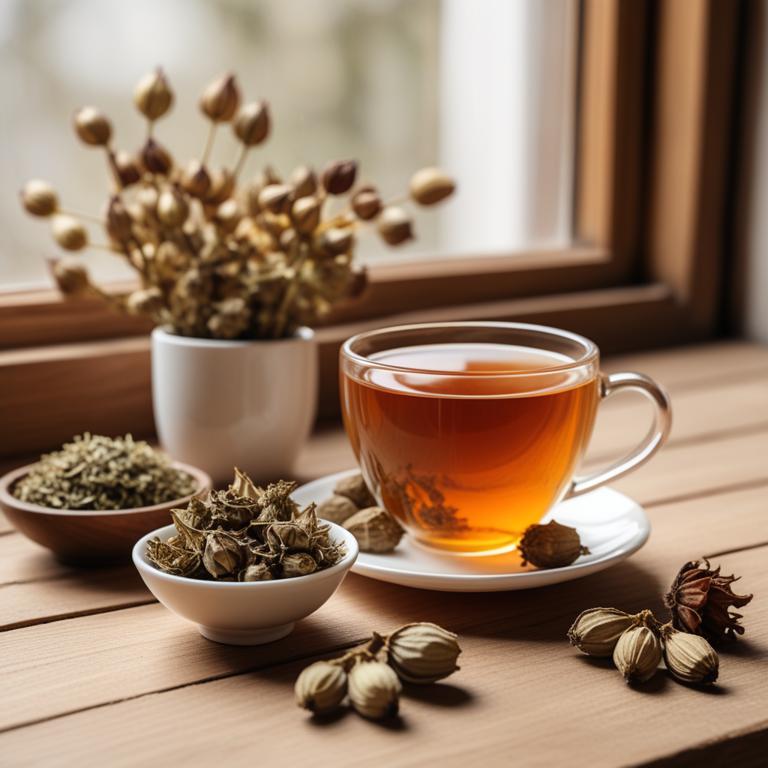
Herbal teas can be a great natural remedy for hemorrhoids.
These teas are made from plants that have anti-inflammatory properties, which help to reduce swelling and pain in the affected area. Aloe barbadensis, also known as aloe vera, is a popular herb used to soothe and calm irritated tissues. When consumed as a tea, aloe vera can help to reduce inflammation and promote healing. Hamamelis virginiana, or witch hazel, is another herb often used to relieve hemorrhoid symptoms. Witch hazel has astringent properties that can help to reduce bleeding and itching. Drinking witch hazel tea may also help to shrink swollen veins and promote a sense of calm.
Urtica dioica, or stinging nettle, is a herb that has been used for centuries to treat various health issues, including hemorrhoids. Stinging nettle tea contains compounds that can help to reduce inflammation and promote healing. Drinking stinging nettle tea may also help to improve digestion and reduce the risk of hemorrhoids. Using herbal teas for hemorrhoids can bring several benefits to your life. For one, these teas are a natural and gentle way to relieve symptoms without the risk of side effects associated with medication. Additionally, herbal teas can be a convenient and cost-effective solution for managing hemorrhoid symptoms.
Furthermore, incorporating herbal teas into your daily routine can promote overall digestive health, which can help to prevent future episodes of hemorrhoids.
- 1. Aloe barbadensis
- 2. Hamamelis virginiana
- 3. Urtica dioica
- 4. Althaea officinalis
- 5. Plantago lanceolata
- 6. Glycyrrhiza glabra
- 7. Vaccinium macrocarpon
- 8. Calendula officinalis
- 9. Equisetum arvense
- 10. Taraxacum officinale
- 11. Aesculus hippocastanum
1. Aloe barbadensis

Aloe barbadensis teas contains active compounds like aloin, aloe-emodin, and barbaloin, which are responsible for its medicinal properties.
These compounds have anti-inflammatory and soothing effects, making aloe vera tea a natural remedy for hemorrhoids. The anti-inflammatory properties of aloe-emodin and barbaloin help reduce swelling and pain, while aloin works to protect the skin and prevent further irritation. The soothing properties of aloe vera tea also help to calm the digestive system, reducing the pressure and straining that can exacerbate hemorrhoids.
Regular consumption of aloe barbadensis tea may help alleviate symptoms of hemorrhoids by promoting healing and reducing inflammation.
- Gather 2 cups of Aloe barbadensis gel and 2 cups of water.
- Cut the Aloe gel into small pieces and put them in a saucepan.
- Add the water to the saucepan and heat it on low fire until the gel dissolves.
- Strain the mixture into a large cup or teapot to remove the gel pieces.
- Drink 1/2 cup of the Aloe tea 2-3 times a day for relief from hemorrhoids.
2. Hamamelis virginiana
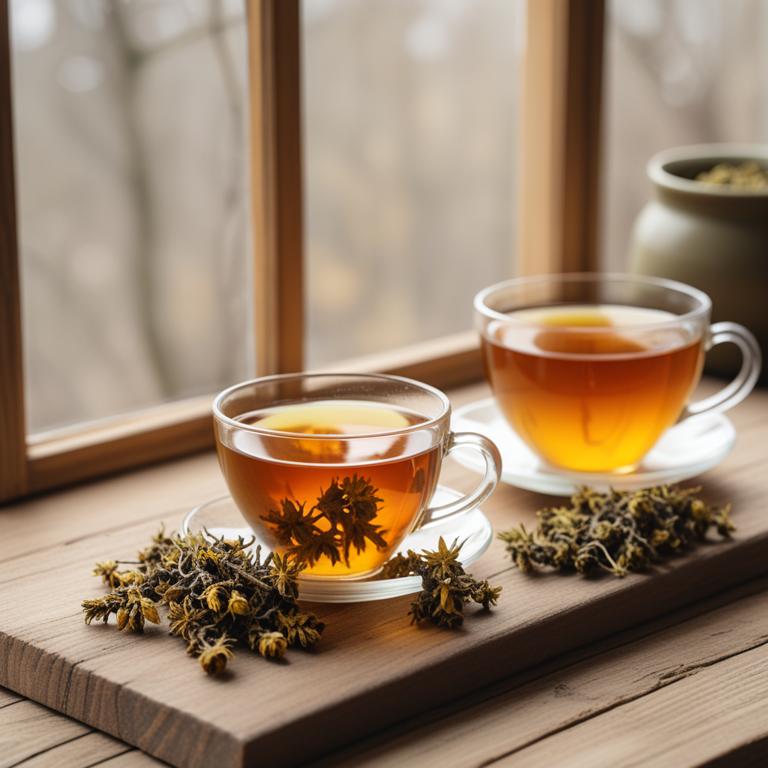
Hamamelis virginiana teas contains bioactive constituents like hamamelitannin, astringent tannins, and flavonoids.
These compounds have anti-inflammatory and astringent properties that help reduce swelling and bleeding in hemorrhoids. The astringent properties of these compounds cause a contraction of blood vessels, which reduces blood flow to the affected area, helping to shrink hemorrhoids. The anti-inflammatory properties of the flavonoids also reduce pain and discomfort associated with hemorrhoids.
Drinking Hamamelis virginiana teas regularly may help to reduce the severity of symptoms and promote healing in the affected area.
- Get 2 tablespoons of dried Hamamelis virginiana leaves and flowers.
- Pour 1 cup of boiling water over the leaves and flowers in a cup.
- Let it steep for 5-7 minutes. Strain the liquid.
- Add honey to taste if desired. You can also add lemon for extra flavor.
- Drink the tea 2-3 times a day for relief from hemorrhoids.
3. Urtica dioica

Urtica dioica teas contains bioactive constituents like quercetin, kaempferol, and rutin.
These compounds have anti-inflammatory and antioxidant properties that can help reduce swelling and alleviate discomfort in hemorrhoids. Quercetin, in particular, has been shown to improve blood vessel function, which can help reduce pressure on hemorrhoidal veins. Rutin, a flavonoid found in Urtica dioica, has been found to strengthen blood vessel walls and improve circulation, further reducing pressure on hemorrhoids.
Regular consumption of Urtica dioica tea may help reduce symptoms associated with hemorrhoids, such as itching, pain, and swelling.
- Gather 1 cup of fresh Urtica dioica leaves or 2 tablespoons of dried leaves.
- Rinse the fresh leaves or dry leaves with water to remove any dirt or debris.
- Place 1 cup of boiling water over the fresh leaves or 8 ounces of boiling water over the dried leaves.
- Steep the leaves for 5-7 minutes to allow the flavors to release into the water.
- Strain the tea and drink 1 cup, 2-3 times a day to help soothe and reduce hemorrhoid symptoms.
4. Althaea officinalis
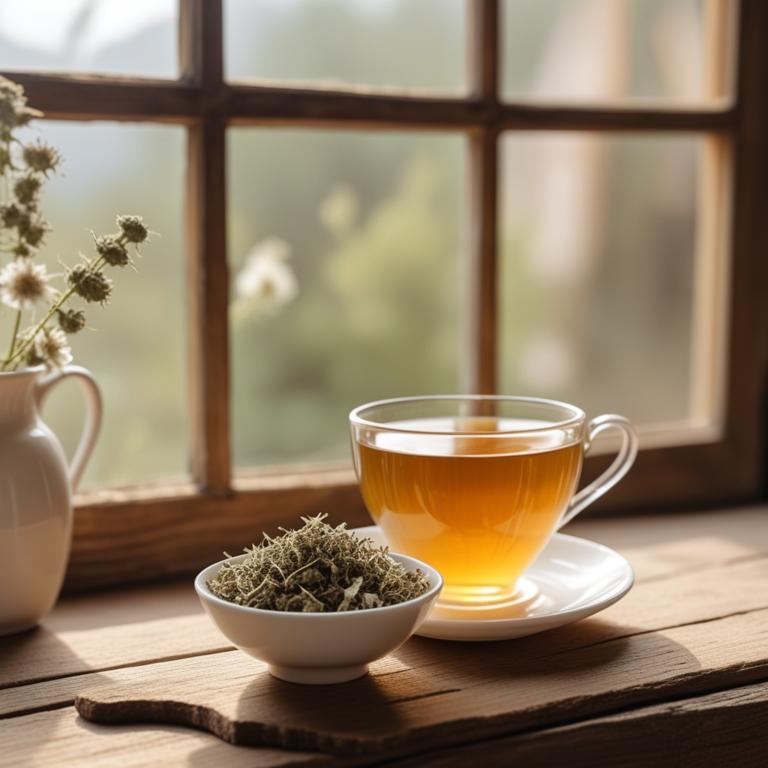
Althaea officinalis teas contains bioactive constituents like mucilages, flavonoids, and phenolic acids.
These compounds have anti-inflammatory and soothing properties that help to reduce swelling and discomfort associated with hemorrhoids. The mucilages in Althaea officinalis teas form a protective barrier on the affected area, providing relief from itching and pain. The flavonoids and phenolic acids have antioxidant properties, which help to reduce inflammation and promote wound healing.
By reducing inflammation and promoting healing, Althaea officinalis teas can help to alleviate symptoms of hemorrhoids.
- Gather 2 tablespoons of dried Althaea officinalis root and 1 cup of boiling water.
- Steep the Althaea officinalis root in the boiling water for 5-7 minutes.
- Strain the mixture into a cup using a fine-mesh sieve or cheesecloth.
- Add honey to taste, if desired. The recommended amount is 1-2 teaspoons.
- Drink the tea 2-3 times a day, as needed, to help soothe and calm hemorrhoids.
5. Plantago lanceolata
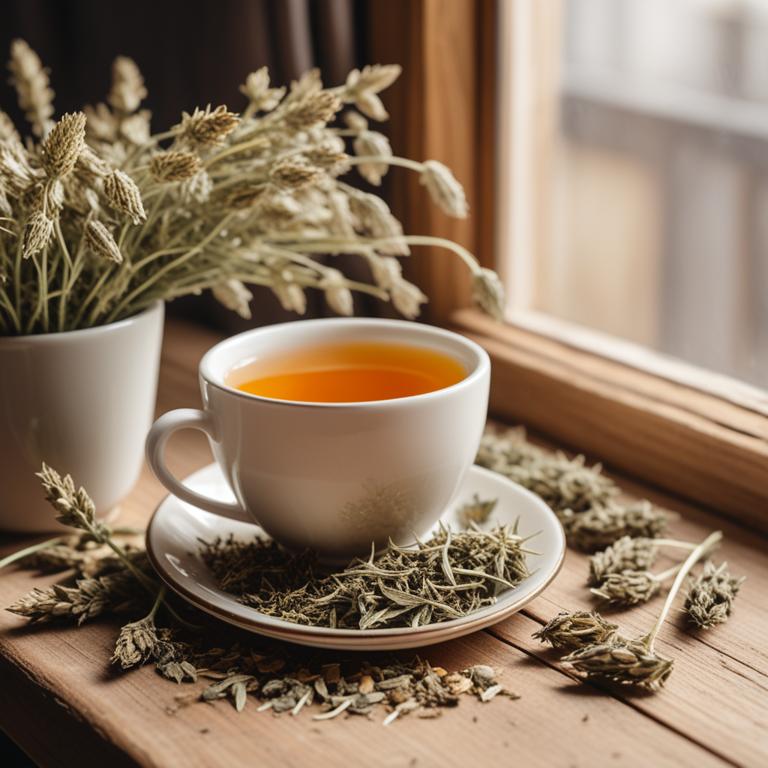
Plantago lanceolata teas contains iridoid glycosides, such as aucubin and catalpol, which are known for their anti-inflammatory properties.
These compounds can help reduce swelling and pain associated with hemorrhoids. Aucubin also has antimicrobial properties, which can prevent infections that often accompany hemorrhoids. Catalpol has antioxidant properties, which can help protect tissues from damage and promote healing.
By reducing inflammation, antimicrobial, and oxidative stress, Plantago lanceolata teas may provide relief from the discomfort and pain caused by hemorrhoids.
- Gather 1 tablespoon of dried Plantago lanceolata leaves.
- Place 1 cup of boiling water in a teapot.
- Add the dried Plantago lanceolata leaves to the boiling water.
- Let it steep for 5-7 minutes, then strain the tea.
- Drink 1 cup of the tea 3 times a day to help relieve hemorrhoid symptoms.
6. Glycyrrhiza glabra

Glycyrrhiza glabra teas contains triterpenoid saponins, flavonoids, and phenolic acids as its bioactive constituents.
The anti-inflammatory properties of these compounds help reduce swelling and discomfort associated with hemorrhoids. Glycyrrhizin, a triterpenoid saponin, has been shown to inhibit the release of histamine and serotonin, which contribute to hemorrhoid inflammation. The astringent properties of flavonoids and phenolic acids help constrict blood vessels and reduce bleeding.
The soothing effects of Glycyrrhiza glabra teas may also help calm irritated tissues and promote healing in the affected area.
- Get 1 cup of dried Glycyrrhiza glabra root. You can buy it from a health food store or online.
- Measure 2 tablespoons of dried Glycyrrhiza glabra root and put it in a tea infuser or a heat-resistant cup.
- Boil 1 cup of water and pour it over the dried Glycyrrhiza glabra root. Let it steep for 5-7 minutes.
- Strain the tea into another cup and discard the solids. Add honey to taste, if needed.
- Drink the tea 2-3 times a day to help with hemorrhoids. You can also store the tea in the fridge for up to 2 days.
7. Vaccinium macrocarpon
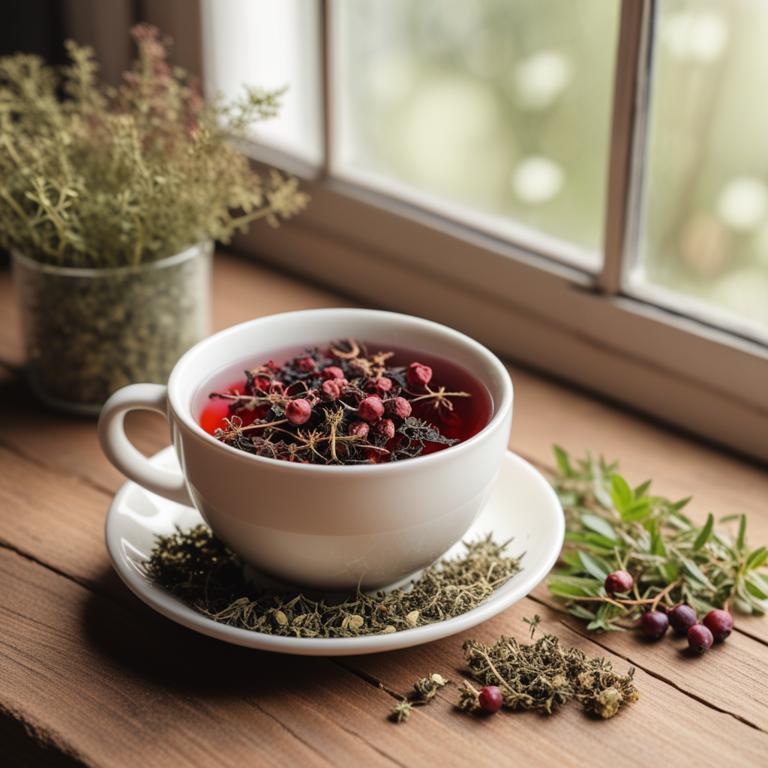
Vaccinium macrocarpon teas contains bioactive constituents like anthocyanins and flavonoids that help reduce inflammation and swelling in the rectal area.
These compounds have anti-inflammatory properties that soothe and calm the irritated tissues, providing relief from hemorrhoid pain and discomfort. The tea also contains tannins, which have astringent properties that help constrict the blood vessels and reduce bleeding. Additionally, Vaccinium macrocarpon teas contain antioxidants like quercetin and kaempferol that help protect the delicate tissues in the rectal area from damage.
By reducing inflammation and promoting healing, Vaccinium macrocarpon teas can help alleviate symptoms of hemorrhoids and promote a faster recovery.
- Gather 1 cup of dried Vaccinium macrocarpon (also known as Cranberry) leaves and flowers.
- Boil 1 cup of water in a pot and let it cool for 5 minutes.
- Add 2 tablespoons of dried Vaccinium macrocarpon to the cooled water.
- Let the mixture steep for 5-7 minutes. Strain the liquid and discard the solids.
- Drink the tea 2-3 times a day as needed to help soothe and reduce hemorrhoid symptoms.
8. Calendula officinalis

Calendula officinalis teas contains triterpene saponins, flavonoids, and carotenoids as its bioactive constituents.
These compounds have anti-inflammatory and antiseptic properties, which help soothe and protect the skin. The flavonoids, particularly quercetin and kaempferol, have a potent anti-inflammatory effect, reducing swelling and pain associated with hemorrhoids. The triterpene saponins also have a soothing effect on the skin, promoting healing and reducing irritation.
By reducing inflammation and promoting healing, Calendula officinalis teas may help alleviate symptoms of hemorrhoids, such as itching, pain, and discomfort.
- Gather 1 cup of dried Calendula flowers.
- Boil 1 cup of water and let it cool for 5 minutes.
- Add 2 tablespoons of dried Calendula flowers to the cooled water.
- Steep the mixture for 5-7 minutes, then strain it.
- Drink 1/2 cup of the tea 2-3 times a day to help soothe hemorrhoids.
9. Equisetum arvense
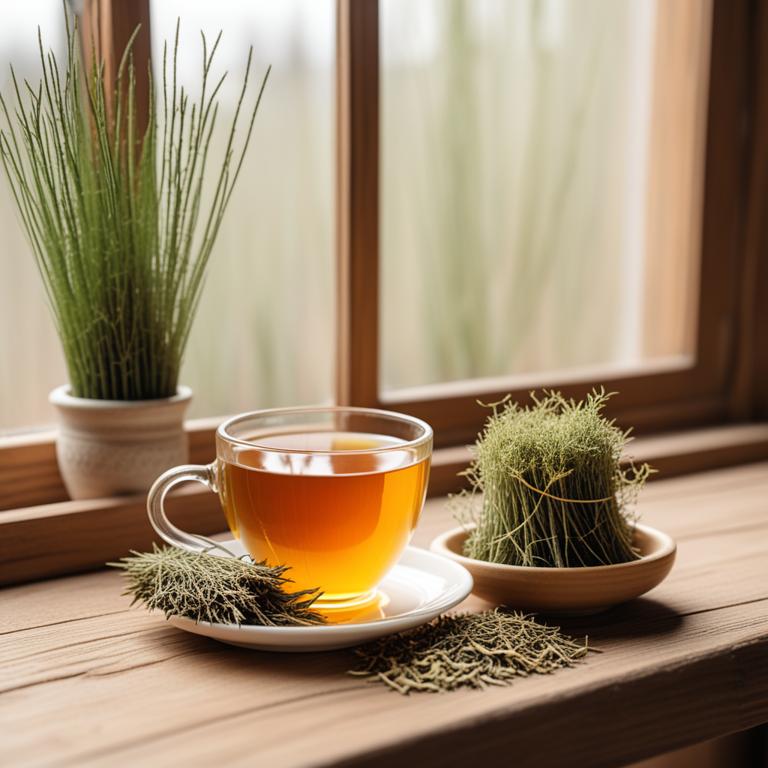
Equisetum arvense teas contains silicic acid, flavonoids, and caffeic acid, which are responsible for its medicinal properties.
Silicic acid helps to reduce inflammation and promote healing in the affected area. Flavonoids, specifically kaempferol and quercetin, have anti-inflammatory and antioxidant properties that can help alleviate pain and discomfort caused by hemorrhoids. Caffeic acid also exhibits anti-inflammatory properties, which can help to reduce swelling and promote tissue repair.
Drinking Equisetum arvense teas may help to soothe and calm the irritated tissues in the anal region, providing relief from hemorrhoid symptoms.
- Gather 2 tablespoons of dried Equisetum arvense root and 1 cup of water.
- Boil the water in a pot and then turn off the heat.
- Add the dried Equisetum arvense root to the boiled water and let it steep for 5-7 minutes.
- Strain the tea into a cup using a fine-mesh sieve or cheesecloth.
- Drink 1 cup of the Equisetum arvense tea 2-3 times a day to help relieve hemorrhoid symptoms.
10. Taraxacum officinale

Taraxacum officinale teas contains bioactive constituents like aucubin, caffeic acid, and luteolin, which are known to have anti-inflammatory properties.
These compounds can help reduce swelling and inflammation in the rectal area, providing relief from hemorrhoid symptoms. The flavonoids in Taraxacum officinale teas also have a soothing effect on the digestive system, which can help alleviate discomfort and pain associated with hemorrhoids. Additionally, the tea's anthraquinone content can help stimulate bowel movements, reducing pressure on the rectal veins and veins around the anus.
By reducing inflammation and promoting regular bowel movements, Taraxacum officinale teas may help alleviate symptoms of hemorrhoids.
- Gather 1 cup of fresh Taraxacum officinale leaves.
- Wash the leaves in a fine mesh strainer under cold running water.
- Bring 2 cups of water to a boil in a pot.
- Add 1 tablespoon of the Taraxacum officinale leaves to the boiling water and turn heat to low.
- Let the tea steep for 5-7 minutes, then strain and drink 1/2 cup, 2-3 times a day.
11. Aesculus hippocastanum

Aesculus hippocastanum teas contains a compound called aesculin, which has anti-inflammatory properties that help reduce swelling and pain associated with hemorrhoids.
Aesculin also has a soothing effect on the digestive system, which can calm irritated tissues and promote healing. The tea also contains another active constituent, aesculetin, which has astringent properties that help reduce bleeding and promote clotting. Additionally, the tea's flavonoids and phenolic acids have antioxidant properties that help protect the skin and mucous membranes from damage.
By reducing inflammation and promoting healing, Aesculus hippocastanum tea may provide relief from the discomfort and pain of hemorrhoids.
- Gather 1 cup of dried Aesculus hippocastanum bark and 2 cups of water in a pot.
- Boil the water and add 1 tablespoon of dried Aesculus hippocastanum bark. Let it simmer for 10 minutes.
- Strain the tea into a cup using a cheesecloth or a fine-mesh sieve. Discard the solids.
- Add honey to taste, if needed. You can also add 1/2 cup of apple cider vinegar for extra relief.
- Drink 1 cup of the tea 2-3 times a day to help alleviate hemorrhoid symptoms.